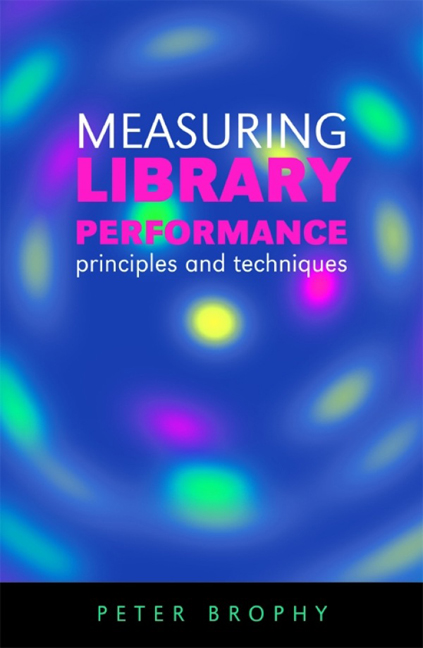Book contents
- Frontmatter
- Contents
- List of figures
- List of tables
- Preface
- Acronyms and abbreviations
- 1 Background
- 2 Theoretical considerations
- 3 User satisfaction
- 4 Impact on users
- 5 Social and economic impact
- 6 Inputs
- 7 Processes
- 8 Outputs
- 9 Staff
- 10 Infrastructure
- 11 Services for all
- 12 Benchmarking
- 13 The balanced scorecard
- 14 Standards
- Appendix 1 Data collection methods
- Appendix 2 The analysis of data
- Appendix 3 The presentation of results
- Index
- Frontmatter
- Contents
- List of figures
- List of tables
- Preface
- Acronyms and abbreviations
- 1 Background
- 2 Theoretical considerations
- 3 User satisfaction
- 4 Impact on users
- 5 Social and economic impact
- 6 Inputs
- 7 Processes
- 8 Outputs
- 9 Staff
- 10 Infrastructure
- 11 Services for all
- 12 Benchmarking
- 13 The balanced scorecard
- 14 Standards
- Appendix 1 Data collection methods
- Appendix 2 The analysis of data
- Appendix 3 The presentation of results
- Index
Summary
■ Introduction
There are considerable benefits from the development and use of standards in performance measurement, not least reduction in individual effort and the possibility of producing results which are truly comparable. It is not surprising, therefore, that over the years different sectors have developed standards and guidelines as a basis for service, some of which have statutory backing. For example, public libraries in England and Wales have been required by law to offer a ‘comprehensive and efficient service’ since the Public Libraries Act of 1964, though what is meant by that has in the past been poorly defined. An attempt to resolve this came in the early 2000s with the development of public library standards to try to provide a yardstick for assessing service economy, efficiency and effectiveness (see below). Another example can be found in the health service sector, where a standards-based approach to accreditation was introduced in 2002 by the Health Libraries and Information Confederation (HELICON), which remarked that ‘part of the quality improvement process in libraries is the development of standards that can be used to assess and support library and information services in providing cost-effective, client-centred services’ (Fowler and Trinder, 2002).
In addition to sectoral standards and guidelines, there is a small number of formal international standards which have been developed by experienced professionals and have received endorsement by the national standards authorities such as BSI and NISO. These are described later in this chapter.
■ Public library service standards
Public library standards were introduced in April 2001 in the UK and subsequently modified in the light of experience and following the publication of the major report,Framework for the Future, in February 2003 (Department for Culture, Media and Sport, 2003). In 2006, public libraries were expected to meet standards defined in terms of ten criteria (www.culture.gov.uk/NR/ rdonlyres/07070797-AE22-4064-8BAF-FEEE2ABA99F9/0/libstandards_ 06.pdf):
• the proportion of households living within specified distance of a static library
• aggregate scheduled opening hours per 1000 population for all libraries
• the percentage of static libraries providing access to electronic information resources connected to the internet
- Type
- Chapter
- Information
- Measuring Library Performanceprinciples and techniques, pp. 166 - 174Publisher: FacetPrint publication year: 2006



